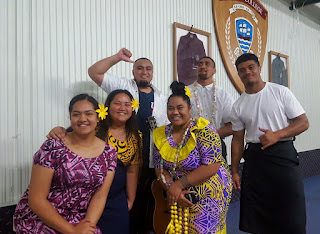Tapena
Prepare
 Preparation is the action or process of making something ready for use. This week my colleagues and I have prepared a virtural Samoan Language Week celebration. Typically our celebrations include live performances from the Samoan Group, student and staff presentations and a shared lunch. We had to scale that right down, due to COVID 19 restrictions. This meant that the preparation had to be specific, compliant with our health/safety guidelines and online friendly.
Preparation is the action or process of making something ready for use. This week my colleagues and I have prepared a virtural Samoan Language Week celebration. Typically our celebrations include live performances from the Samoan Group, student and staff presentations and a shared lunch. We had to scale that right down, due to COVID 19 restrictions. This meant that the preparation had to be specific, compliant with our health/safety guidelines and online friendly.What I have learnt from the concept of 'tapena' is that preparation is an important part of every journey. We need to know the who, what, why, when and where when we are preparing for everything. I know that for my learners, 'tapena' is an integral part of reaching the finish line. It all starts with the teacher and how prepared they are with knowing their learning, what need is and putting this into action.
My role for Samoan Language Week is organising the talent section (performance). As I said earlier, we would always have our Samoan Group perform. This year I proposed to the students that we have a virtual performance where everyone shares a 10 second clip where they are doing a Siva Samoa. I reached out to our former members to see if they wanted to contribute to the video - their response was encouraging. I enjoy the performance element when it comes to Samoan language and tradition. I particularly enjoy preparing students for a performance, seeing a set piece come together from the beginning to end. This virtual performance eliminated any type of rehearsal and was solely reliant on the talent of our former and current students. This freedom is foreign to me (I am a control freak when it comes to performance!) but it is something that I enjoyed being a part of, there is a certain innocence and originality that comes from this.
Oso
Gift
 Our student presenters for this week were Maletina Niko (Y11), Olever Brendon Ulale (Y11), Mua Leilua (Y13) and Vaifoa Lam Sam (Y13/Head Boy). It is always encouraging to hear our young people reflect and express their interpretation of their culture, their identity and values. This is a gift that all teachers appreciate because we understand how reluctant our learners can be to speak in public.
Our student presenters for this week were Maletina Niko (Y11), Olever Brendon Ulale (Y11), Mua Leilua (Y13) and Vaifoa Lam Sam (Y13/Head Boy). It is always encouraging to hear our young people reflect and express their interpretation of their culture, their identity and values. This is a gift that all teachers appreciate because we understand how reluctant our learners can be to speak in public.The final product of the virtual performance for Samoan Language Week is a gift. I tell the students when we are in rehearsal mode, that they should always treat their performance as if it were a gift that they are giving away. It should be something that is treasured, taken care of and prepared. This particular performance is something that I have really enjoyed being a part of. To have former and current students share 10 seconds of their talent (collectively) is a beautiful thing to watch and experience. Thank you to Ms Apelu for organising the video and all of the media for our language week celebrations.
Malaga
Journey
Where to from here? It has been a pleasure exploring the theme 'Tapena sou oso mo lau malaga'. It has been a blessing to work alongside the Samoan teachers at Tamaki College. It is a journey that we take every year and I think it is journey that we appreciate, especially when it is finished.
The concept of 'malaga' is beautiful in that it encompasses the process of life's journey. The 'finish line' is not the main focus, it is more about the lessons, gifts, trials, celebrations and challenges that we encounter in our journey. From the virtual video, student presentations, food, fellowship and preparation, the journey this year for Samoan Language Week 2020 has been unique, enjoyable and memorable.
The student's reflection on the theme provided a perspective that was different and refreshing. Thank you to Mrs Lote-Fepuleai for working with our young people and preparing them for the presentation. Their interpretation of this theme has made me appreciate the gift of language. Language - English or not - is our connection to each other. It is important to share our language with each other, in a way that serves as both a gift to those who are listening and also to those who are sharing. Language can empower and strengthen our relationships and identity. Thank you GOD for a great week. It is done! Tapena sou oso mo lau malaga - Prepare yourself a gift for your travels.
(Special thanks to the Samoan Embassy (Samoan staff) who made this week awesome - Ms Dorothy Apelu, Mrs Makerita Lote-Fepuleai, Ms Sonya Robertson, Ms Josie Apelu & Ms Kalesha Paketama)


















